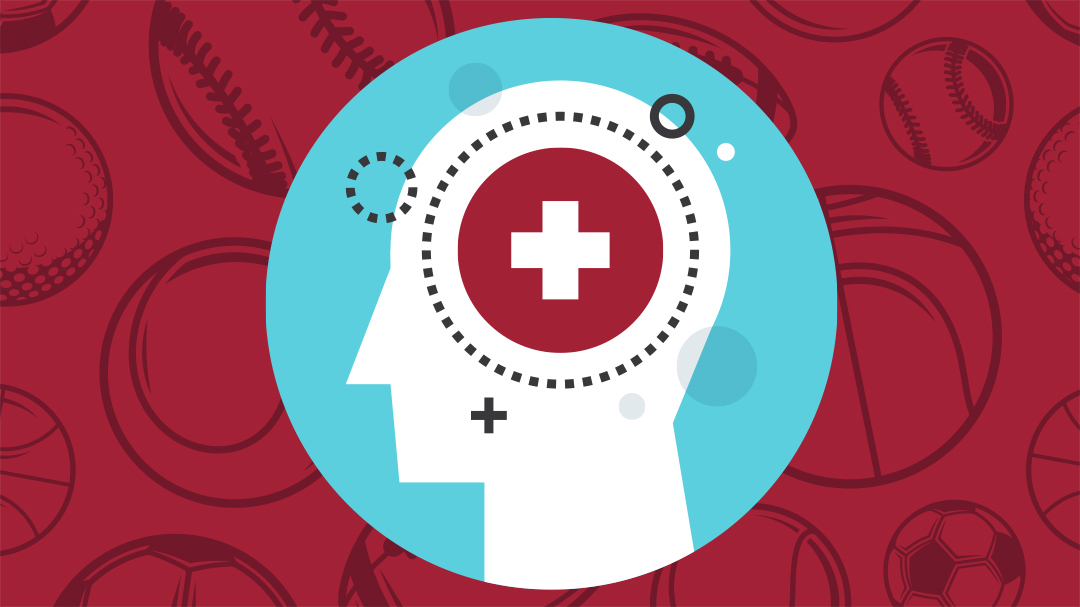Coaches, Trainers and Staff Undergo Mental Health Training
For Muhlenberg Athletics, mental health first-aid training is a game-changer.By: Grace Oddo '22 Monday, February 21, 2022 09:35 AM
 Illustration by iStock
Illustration by iStockOn January 10, Muhlenberg athletics staff, including coaches and athletic trainers, gathered in Hoffman House for an interactive training session on mental health first aid. The facilitators from WholeHealth Sport, the organization Muhlenberg partnered with to provide the training, asked participants to split up into groups. The facilitator outlined a scenario—for example, an athlete is displaying signs of emotional distress—and asked each group what they'd do to respond to such a situation. Participants came away from that part of the all-day training session with strategies they can use to identify students in distress and connect them with help. The College was the first Division III school to offer mental health first-aid training with WholeHealth Sport for the entire Department of Athletics.
“Any time you have opportunities to think critically about an important topic such as mental health, it’s extremely valuable,” says Nate Milne, Muhlenberg’s head football coach. “I think it's important for myself and our staff to have another tool to help our students—especially the ones who may need it the most.”
The idea for mental health first-aid training came about through discussions with Muhlenberg’s student athletes and coaches. At the end of each season, coaches lead check-ins with their teams, where players can freely discuss things that they enjoyed most about the season along with improvements they’d like to see. “Mental health awareness was at the top of most of the feedback we received,” says Director of Athletics Lynn Tubman.
Additionally, Joel Hark ‘22 and Natalie Smith ‘22 founded and currently lead a student-run organization on campus called Head in the Game, which fosters conversations about mental health among student athletes. Assistant Athletic Director and Head Softball Coach Sarah Leavenworth sat in on some of these conversations, and what she heard inspired her to take action. “By going to these meetings, it got me into conversations that I might not have otherwise been a part of,” she says.
Concern about mental health among student athletes is not just a Muhlenberg issue. According to the NCAA Student Athlete Well-Being Study in Fall 2020, student athletes reported feeling increased levels of exhaustion, hopelessness and depression, all feelings exacerbated by the ongoing pandemic.
After some searching, Leavenworth discovered WholeHealth Sport, an organization that helps “sport professionals develop the skills and support to recognize and respond to sport participants who may be navigating mental health or substance-abuse challenges.” Founded by three mental health activists, including Olympic swimming gold medalist Samantha Arsenault Livingstone, WholeHealth Sport provides information, roundtable discussions and other resources to coaches, parents of athletes and sports professionals across the country.
The training consisted of two hours of self-paced homework followed by a six-hour training session led by professionals from WholeHealth Sport via Zoom. Part presentation, part interactive experience, the training taught all of the athletics staff how to handle a variety of mental-health-related situations, including recognizing warning signs, receiving someone who is in distress and connecting athletes with other important resources if necessary.
“As we were going through the training, the one thing I was thinking is that if our students know that we have been trained, they will recognize that support is there,” Tubman says. “And what we’re learning is that you just need one supportive adult in your life in order to make a difference.”
